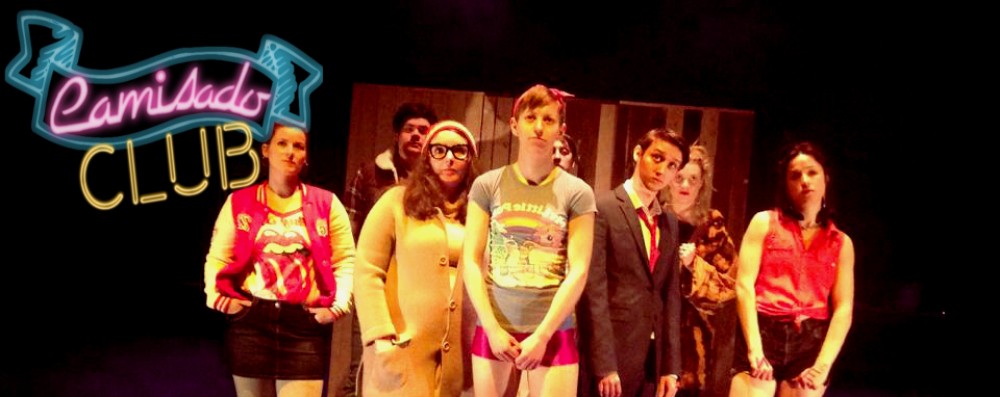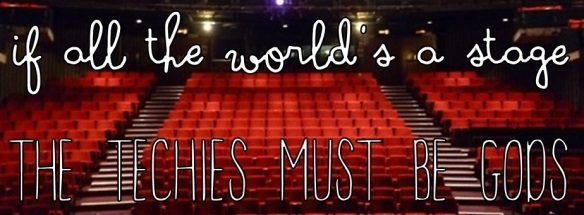It had been a sunny afternoon, the train journey had seen us full of high spirits, and now that the sun was setting, the technical volunteers and I were stood nervously in a circle with a large number of big, hairy, tattooed, burly men in massive Dr Marten boots. As someone with a muscle to bodyweight percentage that is embarrassingly low, I was more than a little intimidated, especially with the prospect of a week in the company of these scary people and being expected to haul big heavy things about, use power tools, and climb tall wobbly ladders. I could already hear the sneers as I thought about all of the steel decking that I wasn’t going to be able to carry.
I am of course describing my first evening in Edinburgh, 2 weeks before the festival was to start. We were stood in the cavernous main hall of King’s Hall, where the friendly Northern Stage management staff had deposited us and told us to build them a venue.
“I am but a wimpy actor,” I told myself. “What on earth have I gotten myself into?”
As the two massive articulated lorries with a theatre packed into them arrived, we started unloading them. It started out easy…plastic chairs, planks of wood, some unwieldy lengths of scaffolding… And just as I thought I might survive the night I spied it – my nemesis, the steel deck. If you’ve never encountered the stuff, steel decking is 8’x4′ platforms that are used to build stages. As you can tell by the name, it’s made of steel, and is really dashed heavy and awkward. We were going to use it to build a new floor surface over most of the church’s existing floor. There was loads of it.
The professional steel deck carriers started throwing the large panels about with apparent ease. I struggled and heaved and managed as well as I could, and I heard no sneers or tuts. In fact, to my relief, the big, scary, burly men offered the other volunteers and I advice on the best lifting techniques, told us not to try to carry more than we could, but still kept handing us them to carry. By the end of night, I was bruised and aching, my hands were numb, my muscles (muscles I never knew existed) were in a state of shock but I had a smile on my face. I’d toiled, I’d struggled and I’d survived…pride in tact.
The rest of the week was much the same. I carried things, I used power tools and I climbed up tall, wobbly ladders. It struck me how masculine the atmosphere was. The big, burly men were no longer scary, they were all very friendly. The moment that endeared them to me the most was when I realised that all of the masculine shows of strength and power tools was all for a team effort to make a theatre, a place for wimpy actors like me to recite shakespeare and wheel about on rickety tables. And these people have such a passion for it, and a need to make it perfect. It was the realisation that if all they had wanted to do was carry big things and use loud tools, they could have gone into any number of professions, but they chose to go into theatre, the same profession I chose. And that is when I realised that,
“Yes, I am but a wimpy actor, but I’m glad I got myself into this.”
Once the church hall had been transformed almost beyond recognition into a fully functioning theatre, and the familiar Northern Stage office faces arrived to set up the box office and hang bunting and we were adding the final touches, such as installing coloured festoon lights into corridors and plugging in the outdoor floodlights that made the building shine at nighttime, the artists began to populate the building. The theatre builders morphed into technicians.
Being an actor and working in theatres, you learn to recognise a techie at a glance. Most common traits include:
– a look of stressed grumpiness
– slouched shoulders
– a roll of coloured tape somewhere about their person
– 9 times out of 10 they are wearing shorts.
Before my stint in Edinburgh I’d always been a little scared of techies. They always seemed to get annoyed at actors, weren’t particularly talkative, and did things I didn’t understand and used language that I had no idea what it meant. I felt silly doing warm ups on stage and talking about my character’s emotional journey while they were in the room in case they thought I was just another prima donna luvvie.
By the end of the 5 weeks in Edinburgh, I found myself completely understanding everything: the stressed grumpiness, the slouching, the constant need for coloured tape, the quietness, the jargon and the magic processes of making the lights come on and the sounds be loud. I could even see why you might wear shorts in December. I learned about the magic properties of gaffa tape and cable ties – they are what hold most theatres together.
The reason for all of these things is it’s a damned tough job. It’s tiring, it’s stressful, it’s complicated, it’s hot and it’s sweaty. And when I’m being an actor or a theatre maker I’m so caught up in my little bubble and getting in the zone and being all “actory” that I forget about all of the work that other people put into shows.
My point, in a very roundabout and babbling way, is that theatre technicians are amazing people. They are clever, passionate, hard working and physically strong. They deal with demanding directors, clueless actors, meticulous health and safety officers and unpredictable technological glitches. I spent a month in awe of these people and their work and now that I’ve had a small taste of what it is to be a techie, I now feel I have earned the right to be a bit “actory” because I can appreciate the other side of it, too. I can lie on my back in the middle of the stage and concentrate on my breathing or stretch out in yoga positions (the easy ones, in my case) without shame, because I know that my doing that is no more important than the techies checking the lights and the speakers work or the ushers checking the seats for litter, or the marketing team proof reading the flyers or the finance team balancing the books. It’s all important.
Back to reality now….
Have a good week!
Caroline x

